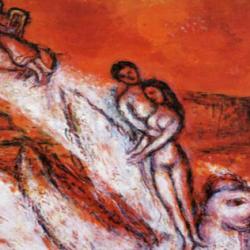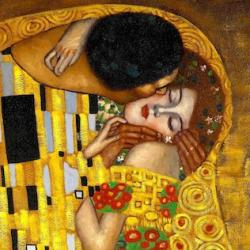A few passages from premodern allegorical readings of the Song of Songs. The first set comes from the Jewish commentator Shlomo Yitzchaki, known as Rashi; the second from Nicholas of Lyra.
Of “Solomon” in the Song, Rashi writes: “Every Solomon (for they were at a loss to explain why Scripture did not mention his father, as it did in Proverbs and Ecclesiastes) mentioned in the Song of Songs is sacred (refers to God), the King to Whom peace belongs.”
He interprets the opening line of the Song (“let him kiss me with the kisses of his mouth”) as Israel’s longing for deliverance from exile: “And so the longing for a kiss is a longing of Israel in exile: She recites this song with her mouth, in her exile and in her widowhood: ‘If only King Solomon would kiss me with the kisses of his mouth as of old,’ because in some places they kiss on the back of the hand or on the shoulder, but I desire and wish that he behave toward me as he behaved toward me originally, like a bridegroom with a bride, mouth to mouth.”
He considers this the “literal” meaning. The allegory is “said in reference to the fact that He gave them His Torah and spoke to them face to face; and that love is still sweet to them, more than any delight.”
In Song of Songs 1:8, Israel asks where to go to find Yahweh and his Torah: “If you do not know, My assembly and My congregation, O fairest of women, among the other nations, where you should pasture and be saved from the hands of those who oppress you; if you wish to survive among them and not have your children lost, then reflect upon the ways of your early forefathers. They accepted My Torah and observed My ordinances and My commandments, and followed in My ways.”
Nicholas too argues that the Song of Songs is a parable, though he faults the Jewish commentators for limiting the poem to the history of Israel. Yet he also believes it’s limiting to see it only as an allegory of the church.
As Nicholas puts it, “the church understood in this way has existed in different times: in some periods she has offended the Bridegroom; in others she has done his will. Again, the church is gathered together from different nations, that is, from the jewish and gentile peoples, it contains the just and unjust, bishops and those subject to them. These, and other factors, make for the difficulty of the book; for there are frequent shifts of one time-frame to another, from one part of the Church to another, and from the Church to God and back again.”
Nicholas says that the romance/marriage of Israel begins with Sinai: “even if . . . the Church has its origins in the beginning of the world, it first receives the name of Bride specifically at the giving of the Law on Mount Sinai, by virtue of which the people of Israel were betrothed to God by faith and worship, while the other nations fell into idolatry. Hence, when Solomon, writing at the dictation of the Holy Spirit, tells of God’s love and the Church’s love under the descriptions of Bridegroom and Bride, he begins from the time of the Exodus from slavery in Egypt, for that was when the Law was given. For this reason the book is divided into two parts: the first gives an account of this same love in its Old Testament context; the second in the context of New Testament times. The first part is divided into three sections, of which the first tells of this love as far as concerns the escape from Egypt; the second describes the journey through the desert – beginning from While the King. . . (Sg 1:12); the third tells of the cross of the borders into Judea, beginning at chapter 4, I will go (4:6).”
Following Rashi, Nicholas says that the first line of the Song indicates that “the people of Israel as bride “have ardently desired their escape from Egypt so as to be free from a cruel slavery and so as to be able to serve God with greater freedom and to cling to him with greater intensity.”
Other parts of the Song also refer to events within Israel’s history. “Your name is poured out like oil” means that “because of the wonders which God wrought for the sons of Israel in Egypt and in the Red Sea, the reputation of his name and of his goodness is spread to other peoples, with the result that many were converted to the jewish faith.” The maidens who love him are “many Egyptians were thus converted and fled from the land of Egypt with the sons of Israel.”












